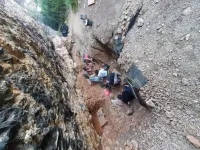(Press-News.org) An unchartered area in the foothills of the Southern Pyrenees in Spain is providing insights into a poorly known period of Neanderthal history, offering clues that could help archaeologists uncover the mystery of their downfall, according to new research from The Australian National University (ANU).
Abric Pizarro is one of only a few sites worldwide dating from 100,000 to 65,000 years ago during a period called MIS 4. The researchers have gathered hundreds of thousands of artefacts, including stone tools, animal bones and other evidence, providing significant data about the Neanderthal way of life during that time -- largely unknown in human history until now.
The findings reveal Neanderthals were able to adapt to their environment, challenging the archaic humans’ reputation as slow-footed cavemen and shedding light on their survival and hunting skills.
Lead author and ANU archaeologist, Dr Sofia Samper Carro, said that the findings show that Neanderthals knew the best ways to exploit the area and territory and were resilient through harsh climate conditions.
“Our surprising findings at Abric Pizarro show how adaptable Neanderthals were. The animal bones we have recovered indicate that they were successfully exploiting the surrounding fauna, hunting red deer, horses and bison, but also eating freshwater turtles and rabbits, which imply a degree of planning rarely considered for Neanderthals,” she said.
According to the researchers, these new insights challenge widespread beliefs that Neanderthals only hunted large animals, such as horses and rhinoceros.
“Through the bones that we are finding, which display cut marks, we have direct proof that Neanderthals were capable of hunting small animals,” Dr Samper Carro said.
“The bones on this site are very well preserved, and we can see marks of how Neanderthals processed and butchered these animals.
“Our analysis of the stone artefacts also demonstrates variability in the type of tools produced, indicating Neanderthals’ capability to exploit the available resources in the area.”
Shedding light on this crucial transitional period helps archaeologists edge closer to solving a mystery that has plagued researchers for decades: what drove the Neanderthals to extinction?
According to the researchers, finding sites like Abric Pizarro, from this specific and not well-recorded period, gives information about how Neanderthals lived when modern humans were not in the area yet and shows that they were thriving.
“The unique site at Abric Pizarro gives a glimpse of Neanderthal behaviour in a landscape they had been roaming for hundreds of thousands of years,” Dr Samper Carro said.
“Neanderthals disappeared around 40,000 years ago. Suddenly, we modern humans appear in this region of the Pyrenees, and the Neanderthals disappear. But before that, Neanderthals had been living in Europe for almost 300,000 years.
“They clearly knew what they were doing. They knew the area and how to survive for a long time.
“This is one of the most interesting things about this site, to have this unique information about when Neanderthals were alone and living in harsh conditions and how they thrived before modern humans appeared.”
Thanks to modern excavation techniques, Abric Pizarro and other nearby Neanderthal sites provide fine-grain data to understand Neanderthal behaviour.
“We 3D plot every single remain found larger than one to two centimetres. This makes our work slow, and we have been excavating some of these sites for over 20 years, but it turns into a uniquely precise recording of the sites,” Dr Samper Carro said.
“We are interested in how the different data relates to each other, from stone tools to bones and hearths. This more thorough excavation gives archaeologists information on how Neanderthals lived and how long they were in an area.
“It’s not only the individual materials that give us clues, but also where exactly they are found in relation to other materials on the site that helps us understand how and when Neanderthals were visiting these sites. Were they settled there or just passing through?”
The research team also included scientists from the Autonomous University of Barcelona (CEPAP-UAB). Research in the Catalan Pre-Pyrenees is supported by The Spanish Ministry of Science and Innovation and the Culture Department of the Catalan Government.
The research is published in the Journal of Archaeological Science.
END
Rare archaeological site reveals ‘surprising’ Neanderthal behaviour at Pyrenees foothills
2024-08-14
ELSE PRESS RELEASES FROM THIS DATE:
How our biases are reflected in how fast we make decisions
2024-08-14
Quick decisions are more likely influenced by initial biases, resulting in faulty conclusions, while decisions that take time are more likely the result in better information, according to new research led by applied mathematicians at the University of Utah.
A team that included Sean Lawley, an associate professor of mathematics, and three former or current Utah graduate students used the power of numbers to test a decision-making model long used in psychology.
They developed a framework to study the decision-making processes in groups of people holding various levels of bias.
“In large populations, what we see is that slow deciders are making more accurate ...
Brigham study finds shingles increased risk of subsequent cognitive decline
2024-08-14
A new study led by investigators from Brigham and Women’s Hospital, a founding member of the Mass General Brigham healthcare system, found that an episode of shingles is associated with about a 20 percent higher long-term risk of subjective cognitive decline. The study’s findings provide additional support for getting the shingles vaccine to decrease risk of developing shingles, according to the researchers. Their results are published in Alzheimer's Research & Therapy.
"Our findings show long-term implications of shingles and highlight the importance of public health efforts to prevent and promote uptake of the shingles vaccine," said ...
Australians outlive their peers in high income Anglophone countries by 1-4 years
2024-08-14
Australians outlive their peers in 5 high income English speaking countries, including the UK and the US, by between 1 to 4 years, finds an analysis of international longevity data, published in the open access journal BMJ Open.
Most of this advantage accrues between the ages of 45 and 84, with death rates from drug and alcohol misuse, screenable/treatable cancers, and cardiovascular and respiratory diseases all lower, the analysis shows.
While high income countries achieved good life expectancy gains during the 20th century, the trends have been much less favourable in the 21st century, even before the COVID-19 pandemic, note ...
Lack of purpose and personal growth may precede mild cognitive impairment
2024-08-14
Feeling that your life lacks purpose and that there are few opportunities for personal growth in older age may precede the development of mild cognitive impairment (MCI), a frequent precursor of dementia, suggests research published online in the Journal of Neurology Neurosurgery & Psychiatry.
These aspects of psychological wellbeing noticeably decline 2 to 6 years before MCI is diagnosed, even in the absence of evident signs, and irrespective of whether those affected go on to develop dementia, the findings ...
Australia offers lessons for increasing American life expectancy
2024-08-14
UNIVERSITY PARK, Pa. — Despite being home to some of the world’s most dangerous animals, Australia has led the English-speaking world in life expectancy for the last three decades. As for other high-income Anglophone countries, the Irish saw the largest gains in life expectancy, while Americans have finished dead last since the early 1990s, according to a team of social scientists led by a Penn State researcher.
The team published their findings today (August 13) in the journal BMJ Open.
“One lesson ...
Childhood maltreatment is associated with greater cognitive difficulties than previously thought
2024-08-14
SMC Labels – Peer reviewed observational study on humans
Childhood maltreatment is associated with greater cognitive difficulties than previously thought
New research from the Institute of Psychiatry, Psychology & Neuroscience (IoPPN) at King’s College London and City University of New York suggests that the cognitive difficulties associated with childhood maltreatment, and particularly neglect, have been grossly underestimated in previous studies.
The research, published in Lancet ...
Crook croc Cuisine: Could a bad dinner save a species?
2024-08-14
Scientists from Macquarie University working with Bunuba Indigenous rangers and the Department of Biodiversity, Conservation and Attractions (DBCA) in Western Australia have trialled a new way to protect freshwater crocodiles from deadly invasive cane toads spreading across northern Australia.
Freshwater crocodiles (Crocodylus johnstoni) are a culturally significant animal and part of traditional owners’ Dreamtime stories in the region. The loss of these predators also upsets the delicate balance of local ecosystems.
The group’s research, published in Proceedings of the Royal Society: B on August 14, shows a method to significantly reduce freshwater ...
Orlando Health first in the world to use Abbott's new blood test for traumatic brain injuries
2024-08-14
Orlando, FL (Aug. 13, 2024) – Orlando Health Orlando Regional Medical Center (ORMC) is the first hospital in the world to use a new, groundbreaking blood test to help assess patients with suspected mild traumatic brain injuries (TBIs), or concussions. The rapid TBI blood test provides results in just 15 minutes and was developed by Abbott, in collaboration with the Department of Defense, and built upon innovative research that Orlando Health’s Dr. Linda Papa and others helped pioneer over 20 years ago.
According to the National Institutes of Health, traumatic brain injury from accidents or sports is a leading cause of death and disability in ...
Swipe up! Health apps deliver real results en masse
2024-08-14
In a new study, researchers synthesised data from 206,873 people across 47 studies, finding that digital health tools – like mobile apps, websites, and text messages – can significantly improve health and wellbeing by keeping you active, boosting steps, and improving your diet and sleep.
Specifically, electronic and mobile health interventions can help people achieve:
1329 more steps / day
55 minutes more moderate-to-vigorous exercise / week
45 minutes more overall physical activity / week
7 hours less sedentary behaviour / week
103 fewer calories consumed / day
20% more fruits and vegetables consumed / day
5.5 grams less saturated fat consumed / day
1.9 ...
Climate change raised the odds of unprecedented wildfires in 2023-24
2024-08-14
Unprecedented wildfires in Canada and parts of Amazonia last year were at least three times more likely due to climate change and contributed to high levels of CO2 emissions from burning globally, according to the first edition of a new systematic annual review.
The State of Wildfires report takes stock of extreme wildfires of the 2023-2024 fire season (March 2023-February 2024), explains their causes, and assesses whether events could have been predicted. It also evaluates how the risk of similar events ...

